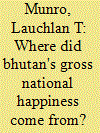| Srl | Item |
| 1 |
ID:
168234


|
|
|
|
|
| Summary/Abstract |
Local religions, Islam and Christianity influence and shape West African livelihoods where for many spirituality is an integral part of work, time and making a living. For farmers the spiritual imbues their understanding of the natural world, as well as affecting the control and allocation of resources and their timely use. For the Sufist Mouride brotherhood of Senegal their work ethic nurtures agriculture and supports a diaspora of petty traders and businesses. Meanwhile, the Christian Pentecostal Church encourages myriad small businesses, and its promotion of a work ethic that has occasioned the contention of a Weberian-style transformation. The creation of sustainable networks of socio-economic change through religious adherence is not in doubt, but whether this will promote a general developmental shift is more contentious. Pentecostals emphasize education and literacy, a priority for most governments, but without job opportunities there is widespread discontent among the young, even the educated. Furthermore, the young are disenchanted by patrimonial-clientelist societies, and it is through religion that violent dissent is articulated. Assertions that religion per se is inimical to social and economic change in West Africa are difficult to substantiate. What is a problem for farmers and small businesses is the uncertainty not just of their immediate environments, but of the volatility and dysfunctional nature of the state, and a lack of enabling conditions. Thus, religion and spirituality provide help in difficult times for people, but also opportunities for improvement in their livelihoods and lifestyles.
|
|
|
|
|
|
|
|
|
|
|
|
|
|
|
|
| 2 |
ID:
144205


|
|
|
|
|
| Summary/Abstract |
The Kingdom of Bhutan has attracted international attention for adopting “Gross National Happiness” (GNH) as its national development policy. The central notion is that gross national happiness is more important than gross national product; the four pillars of GNH are sustainable economic development, good governance, preservation of the natural environment and preservation of the national culture. This paper traces the historical origins of the concept of Gross National Happiness and finds that GNH is newer than the literature and the propaganda usually suggest. Close study of GNH's origins and salience over several decades reveals evidence of the invention of a tradition, in Hobsbawm and Ranger's terms [Eric Hobsbawm and Terence Ranger (Eds.), The Invention of Tradition. Cambridge: CUP, 1983]. The meteoric rise over the last 15 years of GNH as Bhutan's official ideology is a key part of the Bhutanese state's efforts at nation building in the context of rapid and disruptive social and economic change in a highly plural society.
|
|
|
|
|
|
|
|
|
|
|
|
|
|
|
|